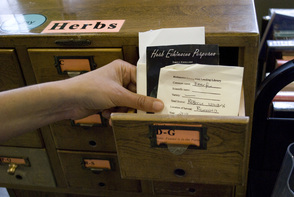Richmond Grows a Seed-Lending Library

The working-class and often under-served city of Richmond, CA, has sprouted a lending library where you can “check out” vegetable seeds for free by Katherine Russell Since May 2010, Richmond Grows Seed Lending Library—the sixth such “flowering” of a growing global movement—allows its borrowers to choose free seeds from beans to tomatoes, even the more challenging-to-grow pepper plant. The catch? Instead of fines or produce, members are encouraged to return seeds from their own first-harvest crops to replenish and pay forward the organic stockpile for future borrowers. In a world facing the rapidly encroaching mutated and modified seeds by the likes of GMO giant Monsanto, the purpose of Richmond Grows and its sister seed-lending libraries is to act as a repository for heirloom and organic seeds while modeling sustainability for local communities. Seed libraries also support the flourishing of homegrown libraries that can be replicated anywhere, by anyone. For some of these offshoot seed libraries, the focus is on specific regional varieties, while others branch off into seed or crop swaps, community service skill building or other sustainability goals. As Rebecca Newburn, co-founder and coordinator of Richmond Grows, points out, “We create community. We provide food access for people who may not have access to healthy food without us. Our work dovetails with all the great things happening out there in the social justice and biodiversity movements.” Since Richmond Grows operates out of the Richmond Public Library, the seed library benefits from the resources of its landlord. “The public library has also bought every book I’ve recommended for classes, so people can check out books about their classes and follow up on special interests,” Rebecca notes. The seed library lends out more than lima beans and peas to its patrons: Besides its educational component of on-site classes and free on-line tutorials, outreach is perhaps Richmond Grows’ biggest bumper crop. “It has been such an honor and a pleasure to get more involved with the community through all of our classes and all the things we do, and working with our 100 percent volunteer staff and educators,” Rebecca says. In fact, she’s seen significant community growth in the three brief years since Richmond Grows sprouted. “We now have a lot of people using the seed library. It’s nice to know that people are able to grow their own food. We have Crop Swap on Mondays and Tuesdays—people are bringing produce, some of which they got from the library seeds; they share recipes and crops and friendships,” Rebecca recounts. Remarkably for such a young project, many of the founders’ original goals for Richmond Grows have already been met. They also dreamed of creating an international movement, and now 170 seed lending libraries have opened in 35 states and 10 countries. They wanted to create an online resource to empower people worldwide to build their own seed libraries, and Rebecca says that they’ve met that goal as well. “When we provide resources, we’re creating this huge network where any new library can plug in. You don’t have to reinvent the wheel for every new library. I’m a middle school teacher and my kids set up their own seed library just using the Richmond Grows online website instruction.” She also adds, “The seed library has value now. The importance of biodiversity is huge.” What the seed-lending library ultimately offers borrowers— beyond the goals of sustenance and community—is a protected cache of increasingly precious heirloom and organic seeds, which through their careful tending may provide not only a biodiverse window to our future but connect us to our ancestral past. “To preserve our genetic diversity, to reconnect us to our food and the land, to rejoin the rituals of what our ancestors have done for 12,000 years-there’s a lineage and a wisdom that’s important there,” Rebecca explains. What’s also as important for her home gardeners is the opportunity, as she puts it, to “create a new story” for themselves. More Information: 
If you like this story, please consider taking out a donation-based subscription to support Positive News.
|
|





